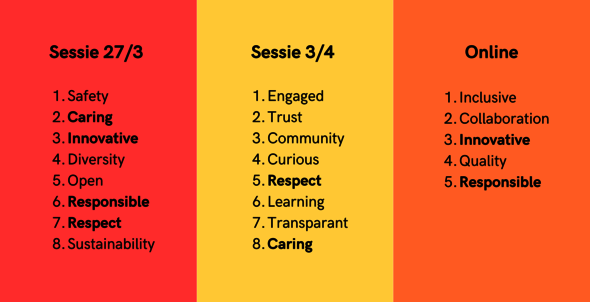
- The University
- 11/04/2024
“Open”, “engaged”, “curious” and “personal” are TU/e’s current core values. One little problem: few people at TU/e seem to be familiar with them. Ingrid Heynderickx, Integrity Ambassador and – along with Rector Magnificus Silvia Lenaerts – one of the initiators of the core values project, shared the following in a previous interview with Cursor: “I can’t tell whether they aren’t being adopted because people don’t believe in them or because they’re simply unaware of them. So perhaps we simply need to publicize the old core values, or perhaps we need to update them.”
To find out whether an update is indeed needed, two sessions were organized on March 27 and April 3 where staff and students could share their opinions. During the meeting on April 3, which Cursor also attended, attendees were treated to an abundance of fresh sandwiches, juices and muffins. And it was a good thing they had something to line their stomachs as the session lasted over four hours.
Top 8 core values
After the reception and introduction by Heynderickx, breakout sessions take place in smaller groups. Twenty potential core values are evaluated; sixteen of them – including the current four – were already established and four new ones are proposed on the spot by attendees. After the breakout session, the results from all the subgroups are combined, after which Heynderickx presents the top 8. The eight core values that emerge on April 3 are very different from the results of the March 27 session. And the input submitted online (via QR codes on the coffee machines) also yielded different results.
Some attendees still feel a bit skeptical after hearing the top 8. “What is the statistical relevance of these scores?” a concerned attendee asks. Heynderickx answers to the audience: “This is not a method to gather quantitative data, the goal is not statistical relevance but to initiate a discussion.” Immediately, another hand shoots up in a different corner of the room: “As a social scientist, I also have qualitative concerns, because many of the values are very similar. Just look at the current top 8, four of these values fall under the same domain.” According to Heynderickx, there is no reason to panic. “Filtering out doubles is exactly what we will be doing in the second breakout session.”
Overlap
During that second breakout session, the ten highest-scoring terms (from the list of twenty potential core values) are discussed in more detail. Each group is assigned two or three of these terms that have a lot of overlap. The groups are to combine and reformulate these terms, where possible, into a term that better fits as a potential core value. For example, one of the groups was given the two terms “collaboration” and “partnership” and merged them into “collaborative”.
The breakout session is followed by a joint discussion afterwards and there is room for questions and comments. Some constructive feedback is voiced from the audience, mainly on the structure and reliability of the open sessions, followed by a discussion on how to control violation of the core values in practice. Someone offers some encouragement to Heynderickx. “I want to thank you for bringing us (the TU/e community, Ed.) together. It’s quite difficult to organize these things bottom-up, and I think you’ve made a good start.”
You can have a long discussion on how to accurately process the different scores and synonyms, but that requires some assumptions
Satisfied?
Personally, Heynderickx is very satisfied, she tells Cursor afterwards. “We were quite pleased with the turnout in both sessions: around fifty people in the first session (March 27, ed.) and around seventy in the second session (April 3, ed.). Fifty responses were submitted via the QR codes.” She also praises the enthusiasm with which the TU/e community is engaged in the topic. “It clearly showed that many students and employees think it’s important to contribute their thoughts on what kind of university we want to be.”
“Of course, there are some areas for improvement,” she writes in an email. “The relative importance of values was rated at both events (but with groups of different sizes) and online (in a slightly different way). In addition, the discussion in the second part of each event showed how we can combine some (similar, ed.) values. You can then follow up with a long discussion on how to accurately process the different scores and synonyms, but that requires some assumptions, which all come with their own pros and cons. The primary goal is for a larger picture to emerge from all the input. We now know that this has indeed happened, but I don’t want to get ahead of the results.”
Planning
These results will first be reviewed and discussed by a select group of ten people who have been tasked with putting together a proposal for the new core values. That group consists of professors, policy officers, a student and support staff. “Their proposal will pass the University Council, the management, and the deans and ultimately needs to be approved by the Executive Board,” explains Heynderickx. During the opening of the new academic year, the new core values will be announced in a grand fashion. “Preferably with a catchy slogan, so it’ll stick with people.”

Discussion